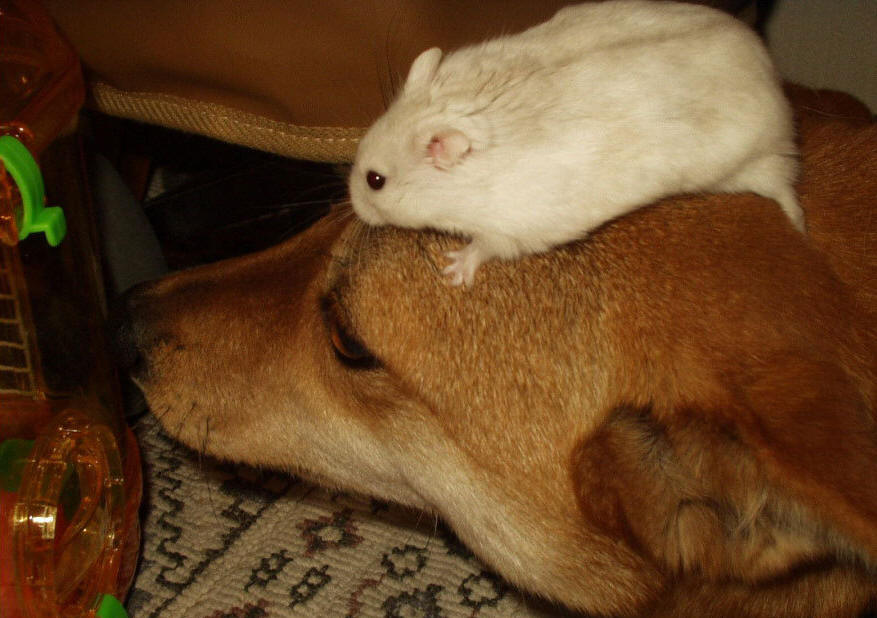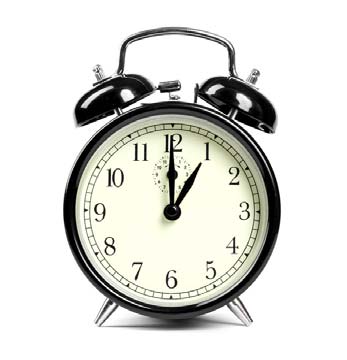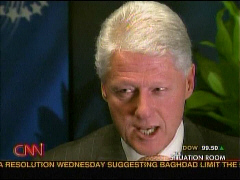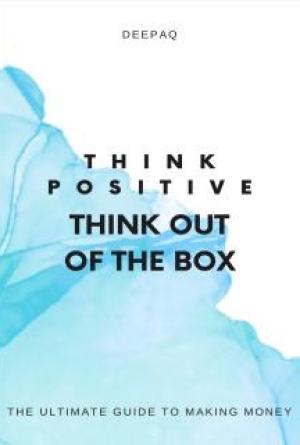
Alternative: Make It A Necessity
An alternative to this is to change your early-rising submodalities to those of something you HAVE to do. I have not tried this, but if you'd prefer to be scared into waking up, it is likely possible. As I stated in the beginning of the book, fear is often what keeps our lives from falling apart. There’s no shame in fear.
Good to know.
In this case, picture things you absolutely have to do, like going to work, remembering your anniversary, or paying your bills. Listen to how you tell yourself to do those things, and to how your brain conveys the urgency and the sense that if you don't do those things, then some awful stuff is going to happen. Pay attention to how that voice sounds and where in your brain it's situated.
Now, tell yourself that you'd better wake up early tomorrow and stay up, using the same voice, and in the same area of your brain. Give this message the look, sound, feel, and location of something you absolutely have to do, or else. Repeat this several times until the message to wake up early is indistinguishable from other no-question necessities.
Like I said, I can't personally vouch for this twist on the previous method, but I imagine it will have some effectiveness in making early rising an imperative for you.
The Method
*Turn Your Tired Brain Into A Joke
How To Do It
Often, the craftiest trick your tired brain has is to tell you to go back to sleep. It’s a simple trick, but a powerful one. You wake up early, and immediately your tired brain starts talking to you in its soothing snake voice:
"Come on, go back to sleep. You know you want to. Just do it. Go back to sleep."
30

That shouldn't be powerful, but it is. Remember, you’re crazy impressionable when you’re tired. In addition, you already know how good it would feel to go back to sleep. You’ve done it before. It feels awesome. It’s right there. Thus, it doesn't take some magic sales pitch for your tired brain to keep you in bed.
Essentially, your tired brain is selling you a gas-guzzling SUV when it’s right in front of you and you've already owned and loved 5 other SUV's in the past. Suddenly it becomes very hard to remember why you wanted that eco-friendly hybrid on the other side of the showroom.
“Trust me, Mac, if you go back to sleep, you’ll be taking advantage of me!” The solution here is to strip your tired brain of that power. Make it laughable. Make it pathetic. Take that villain and make it a cartoon character.
Disclaimer: This technique is straight out of Tony Robbins and NLP. I am not for one second claiming that it's my idea. All I'm doing it adapting it to this specific topic.
The technique is one that Tony Robbins calls "scrambling a pattern". He likens it to scratching up a record or a CD, except you are doing it with an unhappy memory, or, in this case, an insidious voice telling you to go back to sleep. Once the CD, or voice, or memory is scratched, it will never play the same way again.
That much makes sense, but how do you scramble something? Well, you make it funny. You turn it into a cartoon, with happy animals and funny noises and crazy music playing in the background. There's no specific thing you have to do as long as you take something scary or powerful and turn it into something you can only laugh at.
NLP practitioners use this technique to cure phobias. You're going to use it to wake up early.
Here's what I did: I pictured myself waking up early and tried to imagine what my tired voice would say. It 31

immediately started with the usual pitch: "Go back to sleep. Come on, it'll feel good. Just close your eyes.
There you go..."
Sounds normal enough. But then I pictured it again, only this time turning my tired brain into Mickey, Donald, and Goofy. Yes, that Mickey, Donald, and Goofy.
Yeah, I’m not getting sued over this. You know who I mean.
The first time around, I turned my tired brain into a frantic, high-pitched Mickey Mouse. Mickey ran around with his hands on his cheeks, screeching "Nooooo! Don't wake up!! Don't get out of bed! You can't do it! Nooooo!"
On he screamed, "Noooo! Noooo!", as he scrambled around the room, running himself into a tizzy, trying to prevent the calamity of me getting out of bed.
Suddenly, the idea was a little harder to take seriously when it was insane-Mickey telling me to stay in bed. He wasn’t exactly a formidable opponent to deal with.
Then I pretended again that I was waking up early. Again, my tired brain tried to keep me in bed, but this time I turned it into Goofy: a big, fat, cigar-smoking (but still lovable) Goofy.
"Gawrsh!" fat-Goofy said. "Why do you want to get out of bed so early? I've never woken up early in my life, and I'm just fine!" Then Goofy took the cigar out of his mouth and hacked a loud smoker's cough.
Collecting himself, he said, "You should be like me! I sleep till 11 am every day, and I love it!" Then he coughed up another lung.
I looked at Goofy’s huge belly and overall unhealthy (yet still lovable) appearance. It cracked me up. There's just something funny about good-ol’ Goofy being a fat cigar-smoker. And once again, my tired brain became a 32
little less insidious, and a little funnier: something I could laugh at, something much harder to take seriously.
I ran the pattern again a few more times: waking up, hearing my tired brain start to convince me to stay in bed, and immediately turning it into a crazy cartoon character. Every time I did it, it became that much harder to hear my tired brain as it used to sound. All I could hear and picture was Mickey screaming and Goofy coughing. Theirs were the first voices that popped into my head when I pretended to wake up, and they were funny, and they were not at all convincing.
The big test came when I tried waking up early the next morning. Predictably, my tired brain went into action, trying to keep me in bed. But instead of the usual soothing sales pitch, all I heard was, "Nooooooo! Don't wake up! Nooooooo!! Noooooooo!!". Then, "Gawrsh! Why do you want to wake up? Just sleep all day like I do!
::cough, cough, hack::”
I laughed. I got out of bed. One of the major obstacles between me and waking up wasn't so scary anymore.
It’s worked for me since then.
Note: I haven't found a use for Donald yet. So far, Mickey and Goofy have done the trick. I'm holding Donald in reserve just in case.
Go crazy with this one. Identify the voice that tries to keep you in bed (if it’s not immediately apparent, listen for it when you wake up) and then make it toothless. Turn it into any cartoon character you can think of.
Picture colors, animals, music. Give it a dancing choir in the background. Put donkey ears on it. Make it something that makes you laugh, something you would never take seriously. Doing this was one of the most important steps on my path towards comfortably waking up early, and I’m betting it will work for you too.
Any Downsides?
None that I can think of, unless Disney's lawyers come after you. It's important to remember, though, that like any habit, you need to keep drilling this in, a lot at first and then periodically after that. You can't scramble a pattern once and expect it to go away forever. A tiny scratch on a CD might make one song skip, but most of the album will play fine. A ton of deep scratches will prevent the CD from playing at all. This is a great technique for waking up early, but make sure you work with it so it becomes a regular thought pattern.
The Method
Wake Up An Hour Early, Then Go Back To Sleep
How To Do It
Often, the worst part about using an alarm is the finality of it. The alarm goes off, and you’re done. The night flew by, and you barely had a chance to enjoy it. Now sleep is over, and everything begins. You had no warning, no time to prepare.
33


“What’s happening to me?!?!?!”
One way to circumvent this finality is to set an alarm an hour before you want to wake up. Setting two alarms should be easy if you use your cell phone; otherwise, just keep two alarm clocks next to your bed.
When the first alarm goes off, it will serve as a warning, but not a harbinger of imminent doom. It will say, “This isn’t the real thing; I just want to let you know that the real thing is coming in an hour”. After that, whether you’re awake or asleep, you’ll have a more realistic idea of how much time is left.
In addition, this method can lessen the sting of your alarm by dulling any negative associations you have with it. When you have two alarms, suddenly an alarm doesn’t automatically mean “Out of bed, now!” It may also mean, “Go back to sleep; there’s still time.”
I work on many different levels.
Personally, I find it comforting to wake up in the middle of the night and realize that I still have time left. I’m most distraught when the night goes by without me even realizing it was there. Having that last hour to mentally, even subconsciously, prepare would make me feel better. It might work for you, too.
34

Any Downsides?
I’m no sleep-ologist, but interrupted sleep probably isn’t the best sleep. Even if waking up an hour early is more comforting, it might reduce the quality of your sleep. Pay attention to whether or not this method makes you more tired in the long run.
In addition, while this method may work as a temporary crutch, it is at odds with other key advice in this book: namely, that waking up in the morning should not be something that you dread, but rather something that excites you. If you want to wake up early on a consistent basis, then it should be your goal to make it something you enjoy doing.
I’m not knocking crutches here. In a sense, this entire book is a crutch. No matter what gets you to start waking up early and stick with it for a while, eventually it will become a habit. You won’t need anything I’m writing here because waking up early will just be a thing you do. Thus, tricks like setting an “early alarm” can make it easier to get over the hump of your first few weeks until you get there.
The Method
Coffee
How To Do It
Make coffee as soon as you wake up. Have iced coffee waiting in the fridge. Go to Starbucks or some less-evil coffee shop. Drink coffee and enjoy the effects. If you react to coffee the way I do, you’ll be awake and jumping at small noises within a few minutes.
“I think I just heard a sound in China.”
35

Any Downsides?
I have a love-hate relationship with coffee. It’s a temporary stimulant that absolutely works and hasn’t been shown to have any long-term negative effects. You might get addicted, but that just leads to withdrawal headaches, not a stint at the Betty Ford Clinic. Also, it tastes good. I almost always have a cup when I get to work.
At the same time, coffee feels like cheating. This might be the hippie in me, but I always feel like if I need a coffee jolt, then I am not doing something right: either I’m not getting enough sleep, or I’m not eating right, or I’m not exercising enough. I can’t escape the nagging feeling that while coffee works, I should not need it.
Relying on coffee exclusively feels like putting a band-aid on a broken leg.
(no photo available)
That’s just me, though. You don’t have to agree. If you don’t have these hang-ups, and especially if you need some powerful help waking up in the morning, coffee is probably for you.
The Method
Repetition
How To Do It
Keep waking up early. Every time you wake up early, it will become that much easier to wake up early tomorrow. Remember that you are building a habit, and that every repetition makes the habit stronger. Even if there is a grueling hump in the beginning, it will get easier as you keep doing it.
36

Any Downsides?
None, unless you love quitting. And remember, nobody loves a quitter.
“Point well taken.”
The Method
Sheer Freaking Willpower
How To Do It
After everything else, you will still need willpower. One of the purposes of this book is to lessen your need for willpower and to share techniques that will make waking up early less of a slog. It’s incredibly important to build strong motivation for waking up early, and it’s incredibly effective to diminish the influence of your tired brain so it’s not standing in your way.
However, none of these techniques will make you 100% awake and motivated from day one. There is no toy-machine arm reaching down to pull you out of bed. You won’t change your life if you don’t want to and if you don’t try to. You will still need to make smart decisions, and you will still need willpower. Willpower will always be at least a small slice of the pie.
Any Downsides?
Willpower alone may work, but I don’t recommend making it your only tool. However, it is a necessary component of any early-rising program.
37

Helpful Tips
The following are not specific methods for waking up early; rather, they are ideas, insights, and helpful mindsets that are intended to make early-rising easier for you: Keep reminding yourself why you’re doing it.
A tired body can be loud and whiny. It’s almost like a baby. “I want to go to sleep!” “Don’t make me get out of bed!”
Often, it’s easy to give in to this, especially in the moment. That’s why it’s important to fight back by reminding yourself over and over of the benefits of waking up early. Why are you doing it to begin with? What are you hoping to accomplish? What bad habits are you getting rid of?
Keep those thoughts fresh in your mind. Repeat them over and over. That way, when you wake up at 5 am, and your body asks, “Seriously, why?”, you’ll have all the right answers at your fingertips. Solid motivation goes a long way towards getting you out of bed.
Make your identity someone who wakes up at 6 a.m.
I have sometimes seen adults who are in good shape described as “fat kids starving themselves thin”. What that means is that these fit adults were once fat kids, and that since then, they have been frantically trying to keep off the extra pounds that they still see as part of their core identity.
Even after years of being fit, they do not see themselves as naturally fit people; rather, they are naturally fat people who have managed lately to stay one step ahead of the bulge.
Closet fatty.
38

This is a useful cautionary tale, because it illustrates the danger of changing a habit, even a major one, without also changing your core identity. For sure, it can be done, but it will always feel harder, and it will always seem temporary.
Why do our old identities stick around? We form many of them as children and reinforce them every day for years and years. It seems absurd: Bill Clinton doesn’t still think he’s President, but part of me still thinks I’m the awkward, unathletic kid I was in the early 90s. When something is mentally driven in every single day, it’s damn hard to let go of.
“Wait, go back. I’m not what anymore?”
For instance, I still find myself making statements like, “Waking up before the sun rises is uncivilized.” Statements like that have helped to cement my identity as a comfort-seeker and a late riser, even as that is the exact opposite of what I do in the morning.
This is what I’m up against: I’ve always been a late riser, or at least an average riser. Even when I have tried to change that, I have been unable to succeed. The reason, I tell myself, is that it must be my identity, my core, who I really am. I may wake up early every day, but I am not a guy who wakes up early every day.
It’s really tough to alter thoughts like this. They’re buried deep. The solution is to change your identity so it reflects your newer, healthier habit - but how?
Actually, here’s where I admit that I don’t completely know. I have not yet successfully changed my identity to that of an early riser (or, for that matter, an athletically-capable, in-shape adult).
I can, however, urge you to try - just try. Catch your louder thoughts where you identify as a late riser, or a slacker, or as lazy, and do your best to get rid of them. Replace them with thoughts that would make sense for an authentic early riser to think.
Act like somebody who wakes up when he or she wants to wake up and isn’t a slave to tiredness or comfort.
Think like that person; talk like that person. Little by little, it will seep in and positively affect the way you see yourself.
Even if you just do this surface work, it will help you immensely. On a dark morning, the less your actions are 39

battling your core beliefs, the easier it will be to get out of bed and start your day.
Make it your hour.
It can be disorienting to wake up before the rest of the world. Looking around your quiet house, you can start to feel out of step with everyone. Maybe you’re doing something you’re not supposed to be doing. Maybe everybody else is right.
This, of course, is your mind playing tricks on you. One trick is to turn the thought on its head. Make it a point of pride that you’re the only person awake. This is your hour, and only yours. This is where you accomplish things that most people are too asleep to even contemplate. Own it. Look at your clock, and when you see an hour that few people see, say to yourself, “this is my hour”.
“Technically, this town is big enough for the both of us, but not until 8 a.m. So scram.”
Keep your room warm.
One of the biggest impediments to getting out of bed in the morning is a freezing room, or one that is uncomfortable in any way. If the world outside your covers is uncomfortable, then your tired brain will pose a simple question: “It’s cold out there, but it’s warm in here. Which do you prefer?” 40


Go ahead, be that guy.
This visceral “Are you kidding me?” steamrolls over any nobler arguments you might make. It’s simple; it’s correct; and it will keep you under your covers and eventually send you back to sleep.
The solution to this is to make it less scary to leave your covers. Run your heater enough that your room will be toasty when you want to wake up in the morning. Your comfort-seeking brain will still come up with arguments to keep you in bed, but you will have deprived it of a whopper.
Tell yourself all night, “I can’t wait to wake up in the morning.” Yes, this sounds cheesy. It probably is. But I indulge way too often in the alternative. I’ll wake up at 2 am, or, God forbid, a half-hour before my alarm, and think, “Crap! Why isn’t there more time to sleep??” That’s right. I dread waking up. I don’t dread being awake. I don’t dread living life. But because of what I say to myself in the dead of night, I find myself dreading waking up. After all, sleep just feels so good. Why ever end it?
There goes my hero.
41

That’s pretty cracked. Is sleep is the most important thing in the world? I should be excited about beginning my day. If I’m not, then something probably is wrong with my life.
Even if you aren’t willing to get too analytical about sleeping, it can’t possibly be productive to dread your alarm. It’s not a happy thought. So go ahead and change it.
Remember, if you fear your alarm, it will always be a road-block on your path to happily waking up early. Even if you wake up early, you will hate it to some extent. Even if you get enough sleep along the way, it will be filled with more anxiety and dread than is healthy.
The solution is to look forward to waking up in the morning.
“Sure, just as soon as I’m finished looking forward to my dentist appointment.” 42
For real. When you wake up in the middle of the night and begin thinking, “Ugh, only two more hours to go” or
“I wish I had more time to sleep”, catch yourself. Cut off that junk before it does any more damage.
Start thinking, “I can’t wait to wake up in the morning. I can’t wait to wake up in the morning.” Do your best to feel genuinely excited about it. Even if you’re lying to yourself at first, you will eventually start to believe it.
Never underestimate how gullible you are when you’re half-awake.
What I’m suggesting here is changing your entire outlook on waking up early, and I won’t pretend its easy.
Changing a negative thought pattern is never easy. However, it’s easier to at least change what you say to yourself. Replace the negative “Ugh, only two more hours left” with “I can’t wait to wake up in the morning. I can’t wait to wake up in the morning.”
You’ll be surprised at how effectively it changes your attitude when you do actually wake up. It won’t be something you dreaded; it will be something you were actively looking forward to.
Keep doing it until the benefits become apparent.
The best way to convince yourself of the benefits of waking up early is to.....wake up early. Then wake up early again. And over and over and over.





















